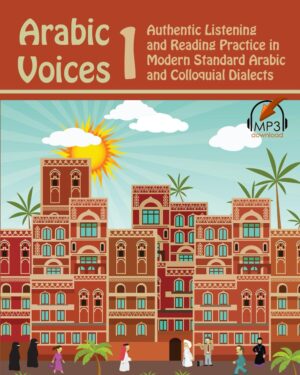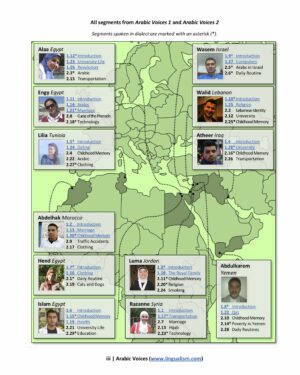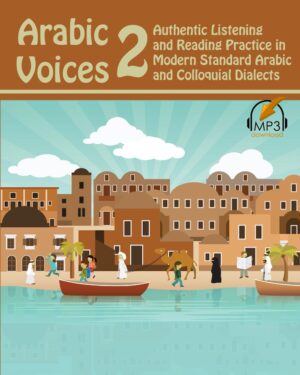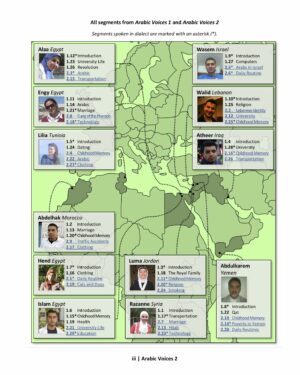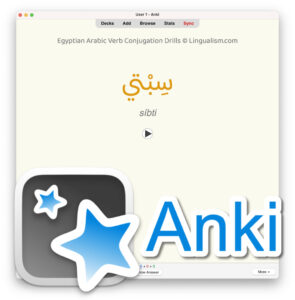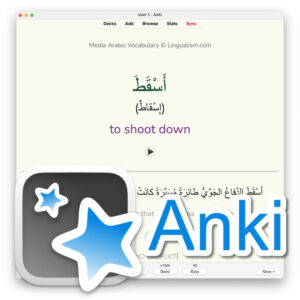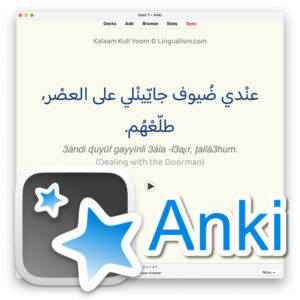☀️SUMMER SALE! 😎SAVE 10% for a limited time. Use coupon code LING10 at checkout. Sale ends July 31. (Offer excludes sale items, bundles, and store credit.)
Home » Modern Standard Arabic » Cats and Dogs–Hend
Cats and Dogs–Hend
| Greetings and welcome! [00:00.2] | السلام عليكم ورحمة الله وبركاته، أهلًا ومرحبًا بكم. | |
| In this video, we will comment on what Hend said about the rights of animals in Egypt, the lives animals live in Egypt, and what various phrases and words she used. [00:04.9] | في هذا الفيديو سنعلّق على ما قالته هند بشأن حقوق الحيوانات في مصر، والحياة التي تعيش فيها الحيوانات في مصر، وسنعلّق على ما استخدمته من عباراتٍ وكلماتٍ مختلفة. | |
| We start on page 107, specifically on line 1, where Hend says, "The ownership of pet cats and dogs in Egypt is linked to social class." [00:19.5] | ونبدأ في الصفحة المائة وسبعة، وتحديدًا في السطر الأول حيث تقول هند: (يرتبطُ اقتناء القطط والكلاب الأليفة في مصر بالطبقة الاجتماعية). | |
| Hend here uses the verb يرتبطُ (linked), and when using the verb يرتبطُ, the preposition بـ must be used after this verb. [00:33.7] | فتستخدم هند هنا الفعل [يرتبطُ]، وعند استخدام الفعل [يرتبطُ] لابدّ من استخدام حرف [ الباء] بعد هذا الفعل. | |
| She says, "one thing is related to another thing; this is related to that." So owning pet cats and dogs in Egypt is related to social class. [00:43.9] | تقول أن (أمر يرتبطُ بأمرٍ أخر)، (هذا يرتبطُ بذاك)، فاقتناء القطط والكلاب الأليفة في مصر يرتبطُ بالطبقة الاجتماعية. | |
| For example, you say, "the price is related to the demand for purchase," the price changes based on the demand for purchase: يرتبطُ بـ [00:57.7] | تقول مثلًا: (أن السعر يرتبطُ بالإقبال على الشراء)، فالسعر يتغير بناءً على الإقبال على الشراء؛ [يرتبطُ بـ]. | |
| Great! We then move to line 3, where Hend says, "While most of those who live in apartments avoid it," and they... Hend here uses the word بينما (while) to link two things that differ from one another. [01:09.8] | عظيم! ننتقل بعد ذلك إلى السطرالثالث، حيث تقول هند: (بينما يتجنبها معظم من يعيشون في شقق سكنية)، وتستخدم هن… هند هنا كلمة [بينما] لتربط بين أمرين يختلف أحدهما عن الآخر. | |
| In the previous line, she says, "dog breeding is common, for example, among the wealthy who own large houses with gardens, while most of those who live in apartments avoid it." What she says on line 3 is different from what she says on line 2. [01:29.5] | ففي السطر السابق تقول: (تشيع تربية الكلاب مثل… مثلًا في وسط الموسورين الذين يملكون منازل كبيرة مزودة بحدائق، بينما يتجنبها معظم من يعيشون في شقق سكنية)، فما تقوله في السطر الثالث يختلف مع ما تقوله في السطر الثاني. | |
| And you can use the word بينما to link two things… to link two things, the second of which differs from the first, [01:50.8] | ويمكنك أن تستخدم كلمة [بينما] للربط بين أمرين… للربط بين أمرين يختلف الثاني منهما عن الأول، | |
| For example, she says, "Many see that the economic situation is improving, while indications are that the situation is not improving," so the second sentence differs with the first sentence, and to connect them the word بينما. [02:02.1] | تقول مثلًا:(يرى الكثير أن الوضع الاقتصادي يتحسن، بينما المؤشرات تدل على أن الوضع لا يتحسن)، فالجملة الثانية تختلف مع الجملة الأولى، وللربط بينهما تستخدم كلمة [بينما]. | |
| Some see it as right, while others see it as the absolute worst or wrong." [02:22.8] | (يرى البعض بأنه صحيح، بينما يرى آخرون بأنه الأسوأ على الإطلاق أو أن بأنه خطأ). | |
| For example, you can say, "Some think this is good, while others think that it is absolutely the worst," the second part of the sentence is completely different from the first part of the sentence, or it is different with the first part of the sentence, and to connect them you use the word بينما (while). [02:31.8] | يمكنك أن تقول مثلًا: (يرى البعض بأن هذا الأمر جيد، بينما يرى الآخرون بأنه الأسوأ على الإطلاق)، فالجزء الثاني من الجملة يختلف تمامًا مع الجزء الأول من الجملة، أو يختلف مع الجزء الأول من الجملة، وللربط بينهما تستخدم كلمة [بينما]. | |
| On line 9, Hend says, "As for the cat… stray cats and dogs in Egypt are not more fortunate than humans." [02:53.3] | في السطر التاسع تقول هند: (أما بالنسبة للقط… للقطط والكلاب الضالة في مصر فهي ليست بأوفر حظًا من البشر). | |
| And when you use the phrase ليس بأوفر حظٍ من (not more fortunate than), it means that the situation is not better at all. [03:06.3] | وعندما تستخدم هذه العبارة [ليس بأوفر حظٍ من]، فهذه العبارة تعني أن الوضع ليس أفضل على الإطلاق. | |
| I say, for example, "This country is not better... It is not more fortunate than the other country," meaning that the situation in this country is not better at all than the other country, they are the same. [03:15.6] | أقول مثلًا: (إن هذه الدولة ليست بأفضل… ليست بأوفر حظٍ من الدولة الأخرى)، أي أن الوضع في هذه الدولة ليس أفضل على الإطلاق من الدولة الأخرى، هما سواء. | |
| My friend is not more fortunate than me," meaning that we both suffer and there is no difference between… him and me, he is not… his situation is not better than me at all, he is not more fortunate than me. [03:30.0] | (صديقي ليس بأوفر حظٍ مني)، أي أن كلانا يعاني وليس هناك فرق بين… بينه وبيني، هو ليس… وضعه ليس بأفضل مني على الإطلاق، فهو ليس بأوفر حظٍ مني. | |
| Great! We then move on to line 10, where Hend says, "Talking about the rights of stray cats and dogs becomes ridiculous in most cases." [03:45.4] | عظيم! ننتقل بعد ذلك إلى السطر العاشر، حيث تقول هند: (يصبح الحديث عن حقوق القطط والكلاب الضالة مدعاة للسخرية في أغلب الأحوال). | |
| And you use في أغلب الأحوال (mostly) this phrase to mean في الغالب. You can use either; both are correct. 'Mostly ridiculous' or 'mostly ridiculous.' Both are correct. [03:59.4] | وتستخدم [في أغلب الأحوال] هذه العبارة تعني [في الغالب]، يمكنك أن تستخدم [في أغلب الأحوال] أو [في الغالب]، كلاهما صحيح؛ (هي مدعاة للسخرية في أغلب الأحوال) أو (مدعاة للسخرية في الغالب)، كلاهما صحيح. | |
| On line 12, Hend says, "Her nature makes her more able to adapt to the harsh conditions of street life." [04:17.6] | في السطر الثاني عشر—تقول هند: (فطبيعتها تجعلها أكثر قدرة على التَأقلُم مع الظروف القاسية لحياة الشوراع). | |
| Hend here uses the masdar (verbal noun) تَأقلُم (adaptation) from the verb تَأقلَم (to adapt), and when using the verb or the masdar, [04:29.8] | وتستخدم هند هنا المصدر [تَأقلُم] من الفعل [تَأقلَم]، وعند استخدام الفعل [تَأقلَم] أو المصدر كذلك، | |
| we must use مع (with) with this verb. You say, 'adapt to living conditions, adapt to life conditions," and so, مع must be used with this verb. [04:39.8] | فلا بدّ من استخدام [مع] مع هذا الفعل؛ تقول (تَأقلَم مع ظروف المعيشة، التَأقلُم مع ظروف الحياة)، وهكذا، فلابدّ من استخدام [مع] مع هذا الفعل. | |
| Then we move on to line 16, where Hend says here on line 16, "Given the scarcity of shelters for stray animals in Egypt, the government resorts to what I see as a measure… a cruel and inhumane measure." [04:57.1] | بعد ذلك ننتقل إلى السطر السادس عشر، حيث تقول هند هنا في السطر السادس عشر: (ونظرًا لندرة ملاجئ الحيوانات الضالة في مصر، تلجأ الحكومة إلى ما أراه إجراء… إجراءً قاسيًا وغير إنساني). | |
| Here Alaa (*he means Hend!) uses the phrase ونظرًا لـ (and because of), or you can also say ونظرًا إلى, "and in view of the scarcity of shelters for stray animals in Egypt, or because of the scarcity of shelters for stray animals in Egypt." Both are correct, and they mean 'because of.' The meaning of the phrase ونظرًا لـ in this context is بسبب. [05:15.7] | وهنا تستخدم آلاء* عبارة [ونظرًا لـ]، أو يمكنك كذلك أن تقول [ونظرًا إلى]، (ونظرًا إلى ندرة ملاجئ الحيوانات الضالة في مصر، أو نظرًا لندرة ملاجئ الحيوانات الضالة في مصر)، كلاهما صحيح، وهما يعنيان [بسبب]، معنى عبارة [ونظرًا لـ] في هذا السياق أي [بسبب]. | |
| Due to the dearth of stray animal shelters in Egypt, the government is resorting to what I see as a cruel and inhumane measure." [05:40.3] | (بسبب ندرة ملاجئ الحيوانات الضالة في مصر، تلجأ الحكومة إلى ما أراه إجراءً قاسيًا وغير إنساني). | |
| You can say, "Due to his difficult living conditions, the government decided to exempt him from taxes," that is, "because of his difficult living conditions, the government decided to exempt him from taxes." نظرًا لـ in the sense of بسبب. [05:49.4] | يمكنك أن تقول: (نظرًا لظروفه المعيشية الصعبة، قررت الحكومة إعفائه من الضرائب)، أي (بسبب ظروفه المعيشية الصعبة، قررت الحكومة إعفائه من الضرائب)؛ [نظرًا لـ] بمعنى [بسبب]. | |
| Great! We then move on to line 19 where Hend says, "But these efforts remain a drop in an endless sea," and this phrase you can use when… when you want to say that something is very small when you say a point in a sea. [06:06.9] | عظيم! ننتقل بعد ذلك إلى السطر التاسع عشر حيث تقول هند: (ولكن تبقى تلك الجهود نقطة في بحر لا نهاية له)، وهذه العبارة يمكنك استخدامها عند… عندما تريد أن تقول أن شيء هو ضئيل جدًا عندما تقول نقطة في بحر. | |
| You can say, for example, that, "This car is a drop in a sea of his possessions," that is, he has possessions… Too many possessions, and this car is only a drop in the ocean. [06:28.9] | يمكنك أن تقول مثلًا أن: (هذه السيارة هي نقطة في بحر من ممتلكاته)، أي أن له ممتلكات… ممتلكات كثيرة جدًا، وهذه السيارة هي فقط نقطة في بحر. | |
| This is a rhetorical phrase that you can use when referring to something that is too small compared to something else, or when you are just talking about something that is too small and not important, or of little size. [06:41.7] | فهذه عبارة بلاغية يمكنك أن تستخدمها عند الإشارة إلى شيء ضئيل جدًا مقارنة بأمرٍ آخر، أو عند فقط الحديث عن شيء هو ضئيل جدًا وليس مهم، أو وليس له حجم كبير. | |
| Great! We then move on to line 24, and at the end of it here she uses Hend بينما (while) again. [07:05.5] | عظيم! ننتقل بعد ذلك إلى السطر الرابع والعشرون، وفي نهاية الأمر هنا تستخدم هند [بينما] مرة أخرى. | |
| Just to clarify, she says, "While another locked up a cat and prevented it from eating, her punishment was hell." She mentions here something different from what I mentioned before. [07:14.9] | فقط للتوضيح تقول: (بينما أخرى حبست قطة فمنعت عنها الطعام، كان عقابها هو الجحيم)، فهي تذكر هنا أمر يختلف عما ذكرته من قبل. | |
| The first woman gave water to a dog, and her reward was Paradise. And on the contrary, another trapped a cat and prevented it from eating, so her punishment was Hell. To connect these two different matters, Hend here uses the word بينما. This is for clarification and explanation more than we have already mentioned. [07:28.3] | المرأة الأولى سقت كلبًا فكان جزاؤها الجنة، والعكس أخرى حبست قطة فمنعت عنها الطعام، فكان عقابها هو الجحيم؛ وللربط بين هذين الأمرين المختلفين تستخدم هند هنا كلمة [بينما]؛ وهذا للايضاح والشرح أكثر مما كنا قد أشرنا إليه من قبل. | |
| I hope you have benefited from this video. [07:53.0] | أتمنى أن تكونوا قد استفدتم من هذا الفيديو. | |
| Thank you very much. May the peace, mercy and blessings of God be upon you. [07:55.5] | أشكركم شكرًا جزيلًا، والسلام عليكم ورحمة الله وبركاته. |
Video Lessons
Arabic Voices MSA Lessons
Arabic teacher Mostafa Ahmed takes us through segments in MSA from Lingualism's book Arabic Voices 1: Authentic Listening and Reading Practice in Modern Standard Arabic and Colloquial Dialects, explaining interesting points of grammar and vocabulary.
© 2024 Lingualism LLC

